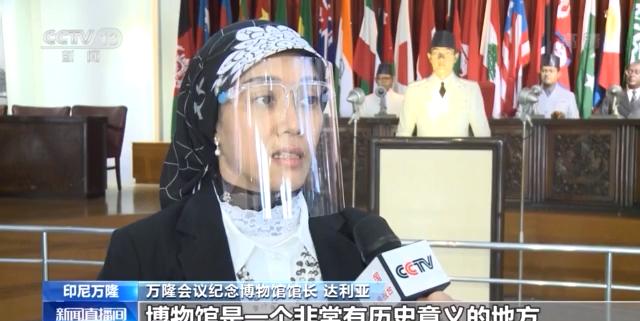The Bandung Conference is an important international conference in the history of New China's diplomacy. In April 1955, government delegations from 29 Asian and African countries and regions gathered in Bandung, Indonesia, to convene the first international conference in history held spontaneously by Asian and African countries. At the Bandung conference, the Chinese delegation was highly praised by the participating countries, and thus opened the door to extensive exchanges between China and Asian and African countries.
Video loading...
In Indonesia, the Independence Building, the former site of the Bandung Conference, houses the Bandung Conference Memorial Museum. Pictures and scenes recreate the history of the Bandung Conference.

Director of the Bandung Conference Memorial Museum Dalia: The museum opened on April 24, 1980, and it has been 41 years since the museum is a very historic place, because the Bandung Conference is an important memory of world history.
From April 18 to 24, 1955, government delegations from 29 Asian and African countries and regions met in Bandung, Indonesia, to discuss issues of common concern such as safeguarding world peace, striving for national independence, and developing national economy. This meeting is also called the Bandung Conference because it is held in Bandung. China has responded positively and vigorously supported since the gestation stage of the conference. Premier Zhou Enlai led the Chinese delegation to attend the meeting.
At the beginning of the meeting, some contradictions and differences arose among the participating countries, and some countries expressed doubts about China. In view of the tense and complicated situation, the Chinese delegation calmly responded.
Huang Shuhai was a Translator of Indonesian Literature at the Chinese Ministry of Foreign Affairs, and in 1955, at the age of 23, Huang Shuhai witnessed the Bandung Conference as a translator for the Chinese Embassy in Indonesia.
Huang Shuhai, a former staff member of the Ministry of Foreign Affairs and then an interpreter at the Chinese Embassy in Indonesia: Premier Zhou Enlai prepared a speech before leaving Beijing for the meeting, which was relatively long and detailed the achievements of various aspects after the founding of New China and our foreign policy. However, at the beginning of the meeting, Premier Zhou Enlai said and offered to distribute my original speech as a written statement to everyone, and I will make a supplementary statement today, which is very brief. Premier Zhou Enlai began with the first sentence, the Chinese delegation came to seek unity, not to quarrel, and this sentence came out and applauded. Why applaud? This is to put the development direction of the whole conference on the right track. At that time, the leaders of other Asian and African participating countries rushed to shake hands with Premier Zhou Enlai, which was a very touching scene. Premier Zhou Enlai's principles and flexibility in dealing with some issues have been instructive to some leaders in other countries, [they say] the Chinese Communist Party is remarkable.
At the Bandung Conference, the Chinese delegation headed by Zhou Enlai used its political wisdom of shelving differences and seeking common ground while reserving differences to create an example of peaceful settlement of disputes and unity and progress among countries with different social systems, which was highly praised by the participating countries, thus opening the door to extensive exchanges between China and Asian and African countries.
The Chinese delegation also actively carried out non-conference exchanges, promoted the communiqué of the meeting to absorb the suggestions of the Chinese delegation, and formed the ten principles of peaceful coexistence and friendly cooperation, so that the five principles of peaceful coexistence were embodied and extended, and the meeting achieved complete success.
Lete Novati, the daughter of the Secretary General of the Bandung Conference and former Indonesian Foreign Minister Ruslan, often listened to her father talk about the importance of the Bandung Conference.
Reit Novati, daughter of the Secretary-General of the Bandung Conference and former Indonesian Foreign Minister Ruslan: My father said that the Bandung Conference was aimed at facing problems together, seeking solutions, and establishing a position against colonialism. The ten principles summarized at the conference still have an important impact on the world today.
For more than 60 years, the Bandung spirit with "unity, friendship and cooperation" as the core has shone through time and space, illuminating the glorious years of development and prosperity between China and Asian and African countries. The historical mission of the vast number of developing countries in Asia and Africa has changed from striving for national independence and liberation to common development and win-win cooperation. Under the new situation, the spirit of Bandung still has strong vitality.
Ruan Zongze, Executive Vice President of the China Institute of International Studies: In 2015, President Xi Jinping attended the Asian-African Leaders' Meeting and the 60th Anniversary of the Bandung Conference, and President Xi's speech particularly emphasized that one is to carry forward the spirit of Bandung, because this spirit is a historical wealth and a spiritual pillar for the people of Asian and African countries to unite. In his speech, President Xi Jinping organically linked the concept of cooperation between Asian and African countries and a community with a shared future for mankind, which actually represents China's views on the future world situation, including the international order, and China has repeatedly emphasized that cooperation and win-win results can be built in order to build a more beautiful world.
As an advocate and promoter of the Bandung spirit, China has fulfilled its commitments with concrete actions, promoted the high-quality joint construction of the "Belt and Road", promoted the construction of a community with a shared future for mankind, and contributed China's wisdom and strength to safeguarding world peace and promoting common development.
(CCTV reporter Zhao Jing, Jia Jianjing, Li Zhigui, Huang Yichen)
(Edited by Chen Zhuoran)